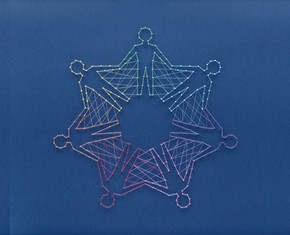The views expressed in our content reflect individual perspectives and do not represent the authoritative views of the Baha'i Faith.
Once upon a time, I had an online friend who went by the handle Mycroft. He was an atheist—still is as far as I know—on a path of spiritual exploration.
We spent pleasurable hours discussing belief, certitude, faith, reason and other subjects of interest to both of us. Well, at least I found the discourse pleasurable. I’m pretty sure Mycroft found it frustrating at times, because I refused to “color inside the lines” of customary religion.
One day Mycroft asked me a fascinating question: “So, is there a specific religious way of exploring?”
Was there a specifically religious way of exploring reality? Given the context in which the question was set, Mycroft was asking how exploration and faith integrated or coexisted.
I guess the definition of faith (or anything else) depends on what dictionary you use. The Oxford Dictionary defines faith thusly: 1. complete trust or confidence in someone or something. 2. strong belief in God or in the doctrines of a religion, based on spiritual apprehension rather than proof. 3. a system of religious belief. 4. a strongly held belief or theory.
The operative meaning of “apprehension” is “understanding; grasp.” There is nothing in the above that restricts the faithful to believing something for which there is no proof, nor is the mechanism for “spiritual apprehension” defined.
So I explained to Mycroft that the Baha’i Faith encourages its followers to think of faith and reason as necessary parts of a whole existence. In fact, Baha’is understand that our faith must be reasonable:
Baha’u’llah declared that religion is in complete harmony with science and reason. If religious belief and doctrine is at variance with reason, it proceeds from the limited mind of man and not from God; therefore, it is unworthy of belief and not deserving of attention; the heart finds no rest in it, and real faith is impossible. How can man believe that which he knows to be opposed to reason? … Reason is the first faculty of man, and the religion of God is in harmony with it. – Abdu’l-Baha, The Promulgation of Universal Peace, p. 231.
I would say there are as many different ways of spiritual exploration as there are scientific ones. I’m not even sure I could state positively that scientific methods relied less on intuition than spiritual ones do. I think the difference lies, in part, in what someone who recognizes the existence of a spiritual reality would accept as an evidence or proof of something.
Mycroft further asked: “So, if a believer concedes that he can’t hold some part of the belief system for true, (“I don’t know exactly how that works. Let’s keep exploring?”) he’s not a believer …”
How so? I can accept as fact that God created the universe(s) (which Baha’u’llah described as “He said BE, and it was,”) yet acknowledge that I don’t know all of the mechanisms that went into that creation. That’s the province of science which is, according to the scriptures of my Faith, a tool for discovery that is as much a product of God’s operation as spirituality. Frankly, the dichotomy seems artificial.
Humankind is at the dawn of understanding the mechanisms of the universe we live in. At the time Baha’u’llah wrote what is now Baha’i scripture (mid-to-late 1800’s), he commented on this:
The learned men, that have fixed at several thousand years the life of this earth, have failed, throughout the long period of their observation, to consider either the number or the age of the other planets. Consider, moreover, the manifold divergencies that have resulted from the theories propounded by these men. Know thou that every fixed star hath its own planets, and every planet its own creatures, whose number no man can compute. – Baha’u’llah, Gleanings from the Writings of Baha’u’llah, p. 163.
I suggested to Mycroft that we shift this to the intellectual and spiritual realm. Gautama Buddha famously said, in his twin verses, that “Hatred is not conquered by hatred; hatred is conquered only by love. This is a commandment eternal.” Abdu’l-Baha, appointed interpreter of the words of Baha’u’llah, concurred: “A thought of hatred must be destroyed by a more powerful thought of love.”
I can say “I believe that love really can destroy hatred,” yet admit to lacking a complete understanding of the mechanism by which that occurs and resolve to explore it. That is not, perhaps, the province of science, but it’s still a worthy study—and that exploration makes me no less a believer.
In fact, I understand more about how love destroys or conquers hatred than I do about how the universe came into being, and that understanding is more applicable and of more immediate relevance to my daily life.
















Comments
Sign in or create an account
Continue with Googleor